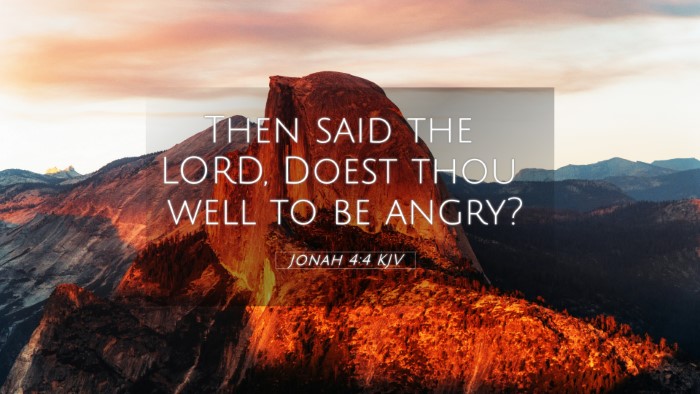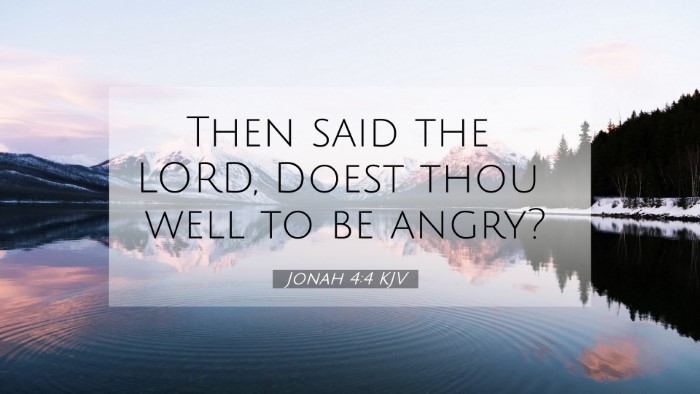Old Testament
Genesis Exodus Leviticus Numbers Deuteronomy Joshua Judges Ruth 1 Samuel 2 Samuel 1 Kings 2 Kings 1 Chronicles 2 Chronicles Ezra Nehemiah Esther Job Psalms Proverbs Ecclesiastes Song of Solomon Isaiah Jeremiah Lamentations Ezekiel Daniel Hosea Joel Amos Obadiah Jonah Micah Nahum Habakkuk Zephaniah Haggai Zechariah MalachiJonah 4:4 Similar Verses
Jonah 4:4 Cross References
Then said the LORD, Doest thou well to be angry?
Uncover the Rich Themes and Topics of This Bible Verse
Listed below are the Bible themes associated with Jonah 4:4. We invite you to explore each theme to gain deeper insights into the Scriptures.
Jonah 4:4 Cross Reference Verses
This section features a detailed cross-reference designed to enrich your understanding of the Scriptures. Below, you will find carefully selected verses that echo the themes and teachings related to Jonah 4:4 KJV. Click on any image to explore detailed analyses of related Bible verses and uncover deeper theological insights.

Matthew 20:15 (KJV) »
Is it not lawful for me to do what I will with mine own? Is thine eye evil, because I am good?
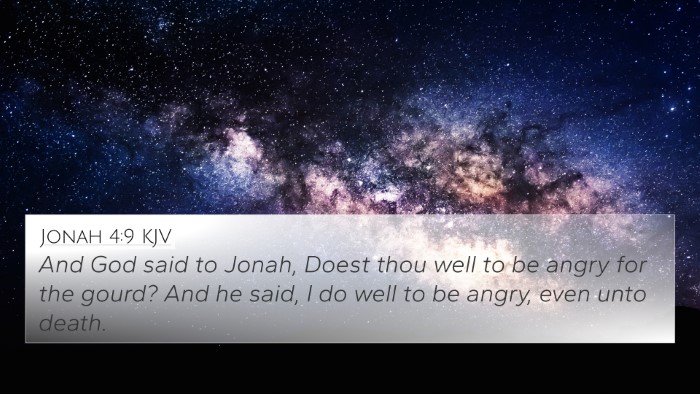
Jonah 4:9 (KJV) »
And God said to Jonah, Doest thou well to be angry for the gourd? And he said, I do well to be angry, even unto death.
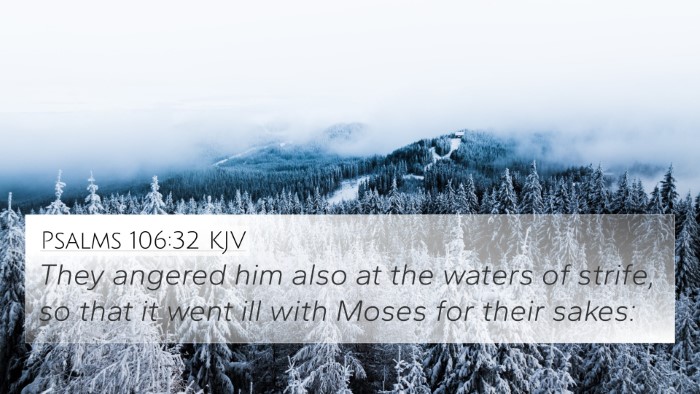
Psalms 106:32 (KJV) »
They angered him also at the waters of strife, so that it went ill with Moses for their sakes:
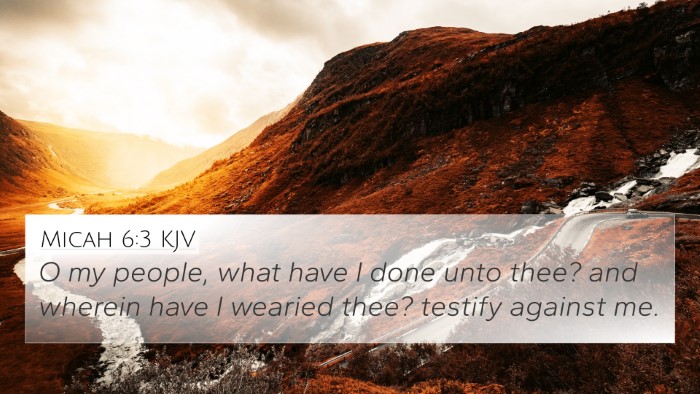
Micah 6:3 (KJV) »
O my people, what have I done unto thee? and wherein have I wearied thee? testify against me.

James 1:19 (KJV) »
Wherefore, my beloved brethren, let every man be swift to hear, slow to speak, slow to wrath:
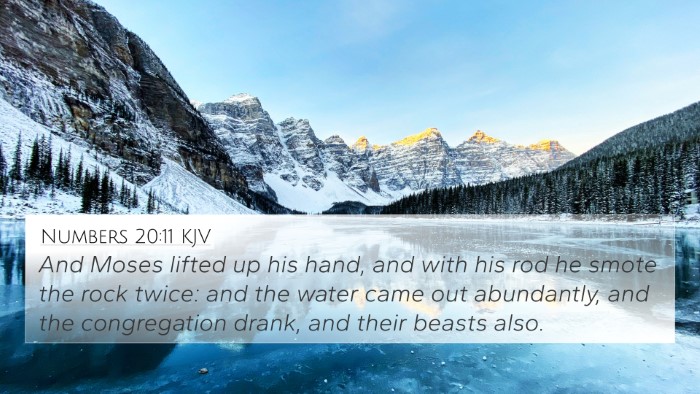
Numbers 20:11 (KJV) »
And Moses lifted up his hand, and with his rod he smote the rock twice: and the water came out abundantly, and the congregation drank, and their beasts also.
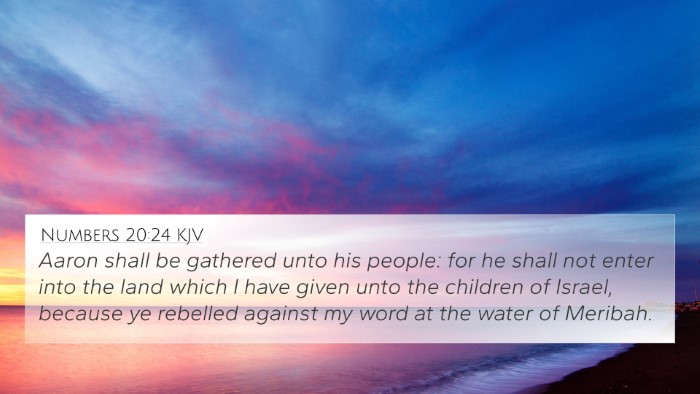
Numbers 20:24 (KJV) »
Aaron shall be gathered unto his people: for he shall not enter into the land which I have given unto the children of Israel, because ye rebelled against my word at the water of Meribah.
Jonah 4:4 Verse Analysis and Similar Verses
Bible Verse Meaning: Jonah 4:4
Verse: Jonah 4:4 - "And the Lord said, Doest thou well to be angry?"
Understanding the Context
The book of Jonah illustrates the prophet's struggle with God's compassion towards the people of Nineveh. After preaching repentance and seeing the city's remarkable conversion, Jonah is displeased, leading to his anger about God's mercy. God's question to Jonah challenges him to reflect on his feelings and attitudes towards divine grace.
Insights from Commentaries
-
Matthew Henry:
Henry points out that God's inquiry into Jonah's anger serves to highlight the inconsistency in Jonah's character as a prophet. Despite being the messenger of God, Jonah's displeasure reveals a profound misunderstanding of God's nature as merciful and compassionate. This moment challenges readers to recognize their own responses to God's grace.
-
Albert Barnes:
Barnes emphasizes the importance of God's question, noting that it invites introspection. Jonah's anger stems from his rigid belief that Nineveh deserved destruction rather than mercy. Barnes encourages readers to consider their own attitudes towards others and the potential for grace in their lives.
-
Adam Clarke:
Clarke elaborates on the emotional state of Jonah, suggesting that his anger is a human response to what he perceives as injustice. He indicates that God's response serves not only to correct Jonah but also to reaffirm the theme of forgiveness and the need for believers to align their hearts with God's compassionate will.
Key Themes
This verse touches upon several key themes:
- Divine Mercy: It illustrates God's willingness to extend forgiveness and grace, even to those deemed unworthy.
- Human Anger: Jonah's reaction serves as a reminder of humanity's flawed understanding of righteousness and justice.
- Introspection: God's question encourages believers to assess their own feelings and attitudes towards others, especially in the context of forgiveness.
Cross References
To deepen understanding of Jonah 4:4, consider the following Bible verse cross-references:
- Exodus 34:6-7: God's self-declaration of mercy and grace.
- Matthew 5:44: Jesus’ command to love enemies, reflecting God’s mercy.
- Luke 15:11-32: The Parable of the Prodigal Son and its themes of forgiveness.
- Romans 9:14-16: God's sovereignty in showing mercy.
- James 2:13: The mercy that triumphs over judgment.
- Micah 7:18-19: A discussion on God's compassion and forgiveness.
- 2 Peter 3:9: God’s patience in desiring all to come to repentance.
How This Verse Relates to Broader Themes
Jonah 4:4 ties into the larger narrative of God's grace throughout scripture. It invites an analysis of the connections between Bible verses related to themes of mercy, forgiveness, and human responses to God's will.
For instance, this verse can be linked thematically with others that address God's compassion versus human anger:
- Connections between Bible verses: This verse parallels with Psalm 103:8-14, where God's compassion is described.
- Comparative Bible verse analysis: Reflect on the contrast between Jonah and the Good Samaritan narrative in Luke 10:25-37.
Tools for Bible Cross-Referencing
Utilizing tools for Bible cross-referencing can strengthen one's understanding. A Bible concordance can help locate themes surrounding mercy and anger throughout scripture, while a Bible cross-reference guide can offer insight into similar narratives.
Conclusion
In conclusion, Jonah 4:4 serves as a pivotal verse that challenges readers to evaluate their understanding of God’s mercy and their own emotional responses. It opens up discussions on the vital connections between various Bible verses that relate to the themes of grace and forgiveness.

